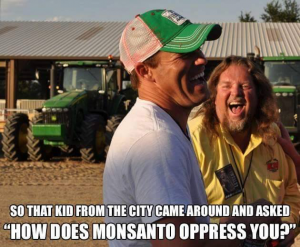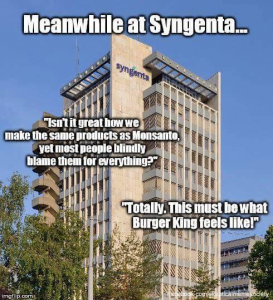I have a confession to make: I’ve never met a real commercial farmer who doesn’t like Monsanto.
Seriously. Come on out to corn and soybean country here in the Midwest (I’m in Iowa) and ask us what we really think. If you try telling farmers Monsanto is evil, they will probably all look at you like you have three heads, while proudly wearing an Asgrow/DeKalb hat. (That’s a popular seed brand owned by Monsanto, for those not familiar with the seed companies.)

The myths and misperceptions surrounding this company are rampant, but I always think it’s important to look at both sides of the issue and do some digging and fact checking. It seems as though a majority of folks believe they are an evil chemical corporation, but if you look at their company history, you will see they sold off a majority of the chemical aspect of the company in 2002. The Monsanto of today is a completely different company than they were decades ago, and they are now primarily a seed business — and have been for more than 15 years. Historically one of Monsanto’s most popular products called Roundup herbicide (glyphosate) has been off patent for years and is made by numerous companies — it’s also true they are not the only company that makes GMOs. It’s silly to blame them for something made by many other companies, right? McDonalds is evil but Burger King is okay? Hmm.

The first GMO was actually produced by Mary Del Chilton of Syngenta, Monsanto’s competitor. Monsanto is a big agriculture company, no doubt, but they are not the biggest and definitely not evil. Remember, the Monsanto of today (focused on agriculture only) and the Monsanto of decades past are literally two different companies. (Monsanto is in the process of merging with Bayer anyway.)
As a real commercial farmer who’s into social media and telling the farmer’s story, it drives me crazy when people believe internet myths before actually asking us as farmers about what we do and why. Despite sensational, agenda-driven movies like “Food Inc” and online YouTube videos and conspiracy theory articles, Monsanto doesn’t have control over us as farmers whatsoever. We have hundreds of seed companies to choose from and thousands of different varieties. People are sometimes led to believe that we are forced to buy Monsanto’s products or that the government pays us to grow their products or that Monsanto has ironclad contracts which force farmers out of business and sue us into oblivion. None of this is true.
Before I go into these topics more in depth let me clarify that I have no ties to Monsanto other than the fact that we buy their seeds. This post isn’t sponsored by them; I personally gain nothing by sharing this information. As Monsanto customers, I would be the first to tell you if they were an awful company to deal with, and we would buy our seeds from a different company if we didn’t like their products.
Companies grow when they sell products. People like Apple products so they choose to buy them and Apple gets bigger, while people tend to enjoy the latest and greatest technology. Farming is no different — technology and improved crop genetics allow crops to flourish in drought and flood conditions; allow farmers to use less chemicals, tillage, and fuel; and allow crops to be more resilient to pests and disease. Proper genetics ensure longer shelf life, higher nutrient content, uniformity in size, shape, color, etc., depending on what you’re growing. The list goes on. Farmers are educated in what they do while working closely with crop advisors, agronomists, scientists, and many other experts in crop health.
Along with purchasing these genetics comes contracts that farmers choose to sign. There is no twisting of our arms; there is no corporate control. As farmers we don’t want to save seeds, and if we don’t want to sign these contracts, we have choices and can buy from other companies, simple as that. To read and see what happens in these contracts and to hear from another farmer’s perspective on them, click this link written by fellow AGDAILY columnist Brian Scott. Another great myth is cross pollination — no farmer has ever been sued by Monsanto for cross pollination. Ever.
So the next time you read something online, consider the source and fact-check. There are plenty of farmers you can ask to see if the claims are true or not, and you can connect with more of them and see additional sources for credible info here as well.
Michelle Miller, the Farm Babe, is an Iowa-based farmer, public speaker and writer, who lives and works with her boyfriend on their farm which consists of row crops, beef cattle, and sheep. She believes education is key in bridging the gap between farmers and consumers.



